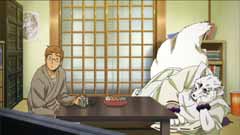

 |
 |
||||
| Home | Reviews | Extras | Forums |
|
Gingitsune: Messenger Fox of the GodsSynopsisMakoto Saeki is the current shrine maiden of a small, local shrine that houses a deity in the form of a large, male spirit fox named Gintaro. As the last in the official line of shrine maidens, Makoto is the only member of the shrine who can see him. Her father, who married into the family, can't. ReviewYou know you're in for some proper slice of life when the synopsis mostly consists of character introductions and little to no actual plot. There is no overarching plot in Gingitsune. It immediately throws you into the life of Makoto and some of her friends and family members, as well as the beings she can see.   But before you start comparing this to... say, Natsume's Book of Friends, it's worth mentioning that Makoto doesn't have Natsume's really sad backstory, nor does she have to hide her abilities to watch spirits; while Gintaro's presence isn't necessarily known to everyone directly, there is this undertone of superstition to it, so people don't think too strangely about Makoto's side job of fortune telling and general advice-giving. Gintaro, her spiritual shrine partner, is what originally drew me to the show. He's a large, male fox spirit with a cross-shaped scar above one of his eyes, and his design, along with the general concept of the show, was what made me interested in it. And as I had hoped, Gintaro is basically more or less what I had hoped; a (technical) adult male who brings an adult attitude to the table (most of the time) and makes adult decisions and partakes in adult conversations... well, as much as one can with a teenager anyway. He's got a very laid-back attitude, prefering to avoid trouble whenever possible. This is the main reason why Gingitsune is a rather laid-back show all in all. Most of the characters in it go through relatively everyday events, interacting with schoolmates and learning relatively minor things about each other. Makoto gains a couple of friends during her tenure in Gingitsune; the first being Ikegami Yumi, a relatively rough girl who is seen hanging around with a group of other girls who are more than willing to resort to threats and bullying to get the results they want. Though she seems rather rough-and-tumble on the surface, not to mention temperamental and blunt, she's otherwise a decent person. In the second episode, we meet up with Funabashi Hiwako, the daughter of a rich family. She immediately comes at odds with Yumi when she chastizes her over not taking school seriously. While Gingitsune's tone is relatively light, this is where the show occasionally delves into more serious segments; the aforementioned meeting with the seemingly incompatible Yumi and Hiwako leads to some bullying attempts by Yumi's associates, which leads to a plot reveleation where the two can meet on more common ground. While Yumi and Hiwako both are more or less full-fledged characters, the show still has a tendency to use them as points of extreme sides to Makoto's mellow middle ground. Not that they argue a whole lot outside of their initial episode, which makes a lot of sense; they're different enough that their interests or, more importantly, desires, rarely clash. Another addition comes another couple of episodes into the show with Kamio Satoru and his companion; another fox spirit named Haru. She's -- and yes, you'll eventually learn that Haru is a girl -- quite young by spirit standards; a mere 500 years or so. Her origin is one of the things that are established in the show, as is the reason why she follows Satoru around. (Well, one of them anyway.) While she does have a bit of a temper and an attitude problem at first, she eventually warms up to the others, tsundere attitude notwithstanding.    I mentioned the designs earlier in the review, and Gingitsune is a pretty well-designed and well-animated show. The fox heralds in the show are all white, with various patterns of red marks on their faces. This goes not only for Gintaro and Haru, but the other fox heralds around the place. Not all heralds are foxes, though; there is also one turtle and two monkey heralds showing up in their own respective episodes, as well as two lion-dog heralds. The only oddity is that while most of the heralds seem like they're taken straight out of Polar Bear's Cafe in design and behavior for being animals, Gintaro has this thing where he's constantly talking from the corner of his mouth, which gives him more of a puppet-like appearance. Still, that's not as much a slight on the animation quality; it's actually pretty good most of the time. Also not as much a slight towards the show, but more of a nitpick is how the whole herald thing works, mostly in regard to who can see them or not. The show portray it as a heriditary ability, but one that mysteriously only works for the oldest member of the family. As in Makoto could only see heralds after her mother had passed away. In Satoru's case, both his parents were already dead, so he inherited that ability when his grandfather died. Gingitsune doesn't really go into how that works, so we're only left to guess. That it's limited to a certain family I get, which is why Makoto is the one left with the ability even though her father is still alive. It's not necessarily hard to follow, but we're still left a bit in the dark about how that works. Some of the episodes' points of crisis management also comes across as a bit too artificial, like the huge argument Makoto gets into with Gintaro in the first episode. She's known him since she was a little girl, so it's odd that his reaction would cause her to blow up on him like that when she should have known how he is for a very long time now. Yet, it was necessary to set up a situation where she'd need his abilities at a point where they're still not talking to each other. There is also one out-of-the-blue argument between Satoru and Haru, where I didn't really feel it made sense for him to blow up on her like that, or say what he did, even if they did explain his thought processes throughout it all. It might seem like minor complaints, but when you pair it up with the actions and reactions of Makoto's friends, Yumi and Hiwako, they do stick out a little as overreactions made for dramatic purposes rather than realistic drama.    But, like I said; those are relatively minor complaints. I expected Gingitsune to be a gentle-hearted slice of life with spirit heralds spicing things up, and that's exactly what I got. It's not the best show ever -- Natsume's Book of Friends is a better show, at its best by a significant margin -- but it's relatively light and enjoyable entertainment with enough substance to not just be empty calories, and an appropriately sweet ending episode that leaves a possibility and a desire for more. A nice companion piece to Natsume's Book of Friends for when you want to give your hankies a rest. — Stig Høgset Recommended Audience: Gingitsune is very short on fanservice, and what little violence there is isn\'t even worth mentioning in a cautionary angle. Satoru\'s family situation and the bullying segment in the second episode is the only thing you should keep in mind when you keep any preteens from watching this. Version(s) Viewed: Digital stream from Crunchyroll, Japanese with English subtitles. Review Status: Full (12/12) Gingitsune: Messenger Fox of the Gods © 2013 Diomedea, Pony Canyon, Gingitsune Production Committee |
 |
|
| © 1996-2015 THEM Anime Reviews. All rights reserved. |